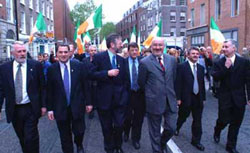 |
Irisch
Republikanische Solidarität
|
 |
BRITISH REFUSE TO RESTORE ASSEMBLY
The British government has refused nationalist calls to lift
its suspension of the power-sharing institutions in the North
of Ireland following Wednesday's election to the Belfast
Assembly.
The British Secretary of State, Paul Murphy, said today it
would be "highly unlikely" that the parties in North could
agree to form an administration within the required six-week
time period.
Mr Murphy has instead announced that a review of the 1998 Good
Friday Agreement would take place early in the New Year, and
that he was writing to all the parties to invite them to take
part.
Both the Sinn Fein President, Mr Gerry Adams, and the SDLP
leader, Mark Durkan, had urged the British government to
restore devolution as soon as possible.
Mr Murphy said: "I don't think we should unsuspend and restore
it now. I don't think that would be wise.
"Everybody knows that if we restored the Assembly tomorrow
then we would have six weeks according to the rules to
establish a government.
"It doesn't take a political genius to work out it's highly
unlikely."
After counts were completed in all 18 constituencies in the
North, Ian Paisley's hardline Democratic Unionist Party
emerged on Friday as the largest grouping in the Assembly. The
DUP holds 30 seats in the 108-seat chamber, followed by David
Trimble's Ulster Unionist Party at 27, Sinn Fein at 24 seats
and the nationalist SDLP at 18. Other smaller groupings and
independents accounted for the remaining nine seats.
The leader of the Democratic Unionist Party, Ian Paisley, said
yesterday he would not be willing to accept the position of
First Minister in an administration that included Sinn Fein
members.
He again said he would not sit down and negotiate with Sinn
Fein.
He told BBC Radio: "I don't accept the principle that we must
sit down with armed terrorists who have enough weapons in
their possession to blow up the whole of Northern Ireland."
Asked if he could accept the title of First Minister, Dr
Paisley said: "Not with IRA/Sinn Fein in government." He
added: "I believe we have a golden opportunity now to have
this matter settled once and for all. If you are going to
take part in the government of Northern Ireland, you can't
have an armed army to use in blackmailing the British
government and trying to get more concessions."
Sinn Fein Assembly member Alex Maskey said Dr Paisley could
not be allowed to renegotiate the Belfast Agreement. He told
Today : "70 per cent of the elected representatives are from
pro-Agreement parties. The Good Friday Agreement is a treaty
between two governments and has been endorsed by a referendum
in Ireland as a whole, so it is not something that can be
tinkered with.
"A new agreement would require a new treaty and a referendum.
It's not a matter for one party to say they will turn that
agreement on its head. The DUP must realise that they can't
usurp the will of the people," Mr Maskey said.
'NO RENEGOTIATION'
Sinn Fein President Gerry Adams said today there could be no
renegotiation of the 1998 Good Friday Agreement.
In a speech to his new Assembly team at Stormont, Mr Adams
said the DUP must not have a veto on implementing the
agreement.
He said: "There can be no re-negotiation of the Good Friday
Agreement. That is our position and we make no bones about it.
The principle structures and obligations of that agreement
cannot and will not be subverted."
Mr Adams, whose party overtook the SDLP as the largest
nationalist group in the Assembly, denied that the current
situation was a stand-off between Sinn Fein and the DUP.
He added: "Sinn Fein recognises and respects the mandates of
all the other parties. We have our own analysis and policies
but this does not prevent us from listening and engaging with
our opponents. On the contrary, unlike the DUP we are not
afraid of dialogue. We are very much in favour of it - that is
why our party has sought meetings with all the other parties
and with the Taoiseach and the British Prime Minister."
Mr Adams said that it was the DUP's choice whether to
participate in the power sharing administration but it could
not act as a veto on other elements of the agreement.
"It is therefore up to Mr Blair along with the Taoiseach to
proceed with their commitments on policing, the criminal
justice system, demilitarisation, the equality agenda, human
rights, the Irish language and other matters including OTRs
(Republicans on the run from conflict-related prosecutions)."
He added: "Sinn Fein will engage in good faith with the
(British) Government and the other parties and we look to
everyone to play a positive leadership role."
Meanwhile, pressure is growing on the DUP to face up to its
responsibilities as the dominant unionist party to protect and
advance the peace process.
The DUP's deputy leader Peter Robinson yesterday denied that
he belonged to a party of "wreckers".
Speaking ahead of today's meeting with the British Secretary
of State, Mr Robinson insisted that his party, famous for its
intense anti-nationalist rhetoric, had a positive agenda.
"Do they really believe voters in Northern Ireland would have
voted for a party of wreckers?" he said.
"The reality is that we have a positive agenda, an agenda for
change."
The DUP has insisted that the Good Friday Agreement must be
renegotiated to create a new settlement acceptable to
unionists. The DUP has so far provided little basis to
believe that it has an alternative.
BACK TO THE POLLS?
Many already believe that the deadlock will only be resolved
by another election. it is thought that the undoubted desire
of northerners for stable, devolved government will eventually
lead to the election of more pro-Agreement candidates.
But Mr Robinson has warned the British Prime Minister, Mr Tony
Blair, against holding another election.
He claimed Mr Blair would receive "another black eye" from
voters if he tries to hold Assembly elections again early next
year.
The east Belfast MP said: "You can imagine how the unionist
electorate would react were he to say that we had to have
another election because he did not like how they voted."
Mr Robinson was commenting as the DUP's 30-strong Assembly
team prepared to hold its first meeting at Stormont.
He said his party's negotiators would be keen to establish
whether the planned review would address the issues his party
had been mandated to pursue.
The East Belfast MP said: "We want to know that we are not
going to be restricted or limited in how we deal with our
supporters' concerns.
"The Government cannot ignore the fact that there is now a 2-1
majority in unionism who are arguing for change."
Meanwhile, Mr Murphy said that the fundamental principles of
the Good Friday agreement must remain.
He said nothing could alter the principles of power sharing
between nationalism and unionism, north/-south relationships
or that the principle of consent was central to politics in
the North.
"The agreement says we should review the operation, the
workings of the Good Friday Agreement,' Mr Murphy said.
"What it gives, is an opportunity to the parties in the
assembly to talk about the issues that affect them."
Mr Robinson said that republicans must not be allowed in
government until the IRA was dismantled.
"They must give up violence. They must stand down their terror
machines. They must hand over their weapons of destruction
that have been held illegally," the assembly member for East
Belfast said.
The Irish Prime Minister, Taoiseach Bertie Ahern, said there
was scope for discussion of many of the DUP's issues with the
present peace process.
The DUP had identified shortfalls in the agreement over
accountability, stability, efficiency and effectiveness that
could be looked at, he said.
"I respect everybody's mandate, including the DUP, and I look
forward to trying to build on the success that has been the
peace process," Mr Ahern added.
Letzte Änderung:
07-Dez-03